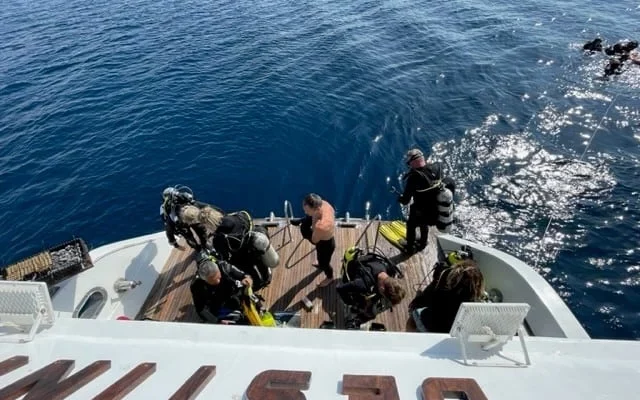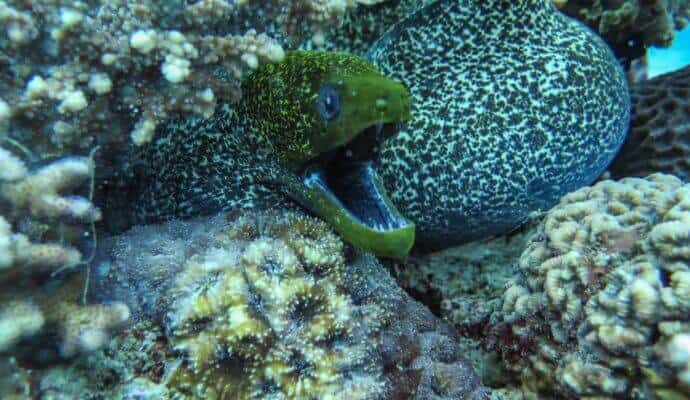Scuba Diving in Freshwater vs Saltwater
Scuba Diving in Freshwater vs Saltwater When you think of scuba diving, many of you likely envision coasting blissfully between blue, tropical waters.

However, the ocean is not the only place that scuba divers flock to.
Many divers enjoy going on freshwater dives in dive sites like lakes, rivers, and quarries.
New divers may wonder if diving in freshwater is different from saltwater. Is it?
Freshwater diving is different from saltwater diving in many ways including buoyancy, temperature, currents, visibility, marine life, and dive types. Learning about these differences is important for deciding if you’d like to try out freshwater diving.
Scuba Diving in Freshwater vs Saltwater Buoyancy
One of the most surprising differences between freshwater and saltwater scuba diving is buoyancy.
This is because salt water is a mixture of water and salt, meaning that it has a greater density.
Water that is denser creates a greater level of downward force, which makes objects more buoyant.
Thus, you will need more weight on saltwater dives than you will on freshwater dives. When you dive into freshwater, you’ll want to start with a bit less weight as there is a less downward force to counteract.
If you don’t know your ideal freshwater weight, you’ll want to do a weight check to ensure you aren’t underweight or overweight.
However, one thing to keep in mind when thinking about weights in freshwater is that freshwater often uses different equipment such as a thicker wetsuit or the addition of gloves or a hood, which can actually mean you need to add weight.
Thus, a beginning diver may want to consult a more experienced buddy for advice on what weight to use.

Temperature
There are plenty of cold places to dive in the ocean just as there are plenty of warm places.
Additionally, freshwater locations can be warm or cold. However, in general, freshwater scuba diving is quite a bit colder than saltwater diving.
This will mean that you will likely consume air more quickly on freshwater dives.
The most popular areas for saltwater diving are tropical areas where the water is frequently very warm, with divers often needing no wetsuit or a shorty.
However, your typical freshwater diving spot will be a bit colder.
This means you may need a thick wetsuit, hood, gloves, or even a dry suit.
Meanwhile, temperatures in freshwater areas tend to have a greater variance from season to season than in saltwater environments.
This means your preparation can be quite different by month. If I dive in my local quarry during August,
I’ll wear shorts. If I dive in November, I’ll be wearing a 7 mm wetsuit.
Current in Scuba Diving in Freshwater vs Saltwater
Another difference between freshwater and saltwater diving is that freshwater currents are lighter and more predictable.
Ocean currents have many factors that generate them, meaning they can vary greatly from one day to the next.
However, freshwater currents are typically caused by wind and are very light. The obvious exception here is rivers. However, currents in rivers are typically fairly predictable as well.
Overall, your dive planning in terms of currents should go as expected in freshwater. You’ll also likely have a more effortless dive in this regard.
Visibility

Visibility is perhaps the factor that scuba divers care the most about.
Most divers long for over a hundred feet of visibility. In saltwater environments, high visibility is typical. In fact, in many places, 30-foot visibility would be considered a very bad day.
By contrast, 30-foot visibility would be viewed as a great day for many freshwater divers as visibility tends to be much less in these environments.
There are certainly exceptions to this. The cenotes in Mexico and Iceland’s Silfra both come to mind as freshwater bodies with almost perfect visibility.
However, if you are diving in your local river or lake, you may find visibility measured in tens of feet or less.
The worst visibility I have ever had in freshwater was 2 feet. In the ocean, it was closer to 40.
The reason that freshwater tends to have less visibility is that the bottoms typically have much denser sediment. Additionally, with less current, particles tend to take longer to settle when disturbed.
Marine Life

Another difference you’ll note is marine life. Saltwater environments are much larger.
Thus, you see a larger variety of inhabitants as well as creatures of much greater size.
When scuba diving in freshwater, you’ll likely see smaller fish and other animals as well as less species diversity.
You’re also likely to see less colourful animals. As my friend often notes, freshwater is filled with “small brown fish.”
Another point is that marine life is typically less fearful of scuba divers in saltwater while freshwater fish may be more likely to keep their distance.
On the positive side, you’re unlikely to encounter many freshwater inhabitants that could harm you which may give some reassurance for a nervous new diver.
Dive Types
The final major difference between freshwater and saltwater diving is the type of dive.
With saltwater dives, you may do a shore dive but are more likely to be going on a boat.
However, freshwater dives are almost always shored dives where you walk into the water.
Thus, you’ll have some different factors to consider.
First, you’ll likely gear up and walk your gear into the water, possibly a bit farther than ideal.
You’ll also want to wear boots. While many divers wear boots in the ocean, they are definitely recommended for freshwater because of the walking.
Furthermore, freshwater diving means you’ll be swimming out to the point that you descend, putting a bit of extra effort into your dive.
However, with your BCD inflated, you can do this as relaxed or strenuously as you’d prefer.
Final Thoughts
Many individuals dive in freshwater, especially those who desire to dive more frequently but don’t live near an ocean.
Diving in freshwater and saltwater usually varies somewhat from one another.
There will be less buoyancy, often cooler water, a less variable current, lesser visibility, and a smaller diversity of marine species while diving in freshwater.
Additionally, you’re more likely to do a shore entrance. Planning beforehand for your unique dive location is crucial as always for making sure you have a good time.
Book Your Trip With Us
With the most affordable diving packages, courses, boat dives, and shore dives in Aqaba book your trip with us today.
Book your trip via Email/WhatsApp
Email: info@dive-inaqaba.com
Website: dive-inaqaba.com
Aqaba Jordan
Phone:
+962 790015103
+962 798949566
For quick booking and information contact us on WhatsApp
